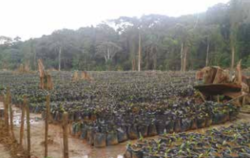
An oil palm nursery in development. Greenfil began activities before public consultations were carried out. (Photo: CED, August 2015)
Central Africa’s rainforests and people suffering from the expansion of palm oil and rubber plantations
Industrial palm oil and rubber plantations in Africa’s Congo Basin continue to disrespect human rights and destroy large swathes of rainforests – the Rainforest Foundation UK (RFUK) reveals in a report published today.
As new figures reveal that 2018 was the third worst year for tropical forest loss since records began in 2002, the investigation, carried out by RFUK and its partner organisations found that three plantations in Cameroon and the Republic of Congo alone were responsible for destroying over 20,000 hectares of forest, an area twice the size of Paris.
Among the report’s key findings are that:
· The Atama plantation in the Republic of Congo is owned by a series of shell companies, and has been largely used as a front for extracting lucrative timber without developing the promised oil plantation.
· The Greenfil palm-oil plantation project in Cameroon has been mired in secrecy and conducted no prior Environmental and Social Impact Assessment (ESIA) as required by law, posing a threat to a proposed national park.
· Sudcam’s rubber plantation, also in Cameroon, was established without a prior ESIA or the free, prior and informed consent (FPIC) of local communities leading to the displacement of indigenous Baka communities.
The report also sheds new light on the human cost of agro-industrial expansion in Central Africa, revealing how, often linked to shady, backroom deals, the conversion of ancestral rainforests is bringing few of the promised economic benefits to rural areas or to national economies, and leading to conflict.
Community members interviewed by RFUK investigators decry seeing their forest being turned into monoculture plantations, the lack of adequate consultation and compensation, scarce and poor quality job opportunities for local people, impacts on nearby protected areas, pollution and, in some cases, social conflict.
“They just came to inform us that the government decided that a company was coming into our community… with government officials intimidating the population with their ranks and titles,” said one community member affected by the Sudcam plantation”.
Simon Counsell, Executive Director of the Rainforest Foundation UK, said “These case studies provide a snapshot of what is essentially a fire-sale of Central African forests that is serving neither these critically important landscapes nor economic development in the region. Governments and investors must realise that there is no path to sustainable development in tropical forests without respecting the rights of those that live in and depend on them.”













